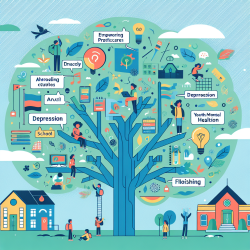The COVID-19 pandemic has brought to light the significant role of psychological factors in influencing public behavior and mental health. A recent study titled "Need for cognitive closure and trust towards government predicting pandemic behavior and mental health: comparing United States and China" offers valuable insights into how these factors operate differently across cultures. As practitioners, understanding these dynamics can enhance our ability to support individuals during such crises.
The Role of Cognitive Closure and Trust
Cognitive closure refers to an individual's desire for a firm answer to a question, reducing uncertainty and ambiguity. This need can significantly impact how people respond to public health guidelines during a pandemic. The study found that individuals with a high need for cognitive closure are more likely to comply with societal norms and public health measures, especially when they trust their government.
Trust in government plays a crucial role in mediating the relationship between cognitive closure and pandemic behaviors. In China, where trust in government is generally higher, this trust significantly predicted better mental health outcomes and greater compliance with COVID-19 guidelines. In contrast, in the United States, where trust in government varies widely, this relationship was not as strong.
Cultural Differences in Pandemic Response
The study highlights stark cultural differences between the United States and China regarding pandemic compliance behaviors. Chinese participants reported higher levels of trust in their government, more positive attitudes towards preventive measures, and fewer depressive symptoms compared to their U.S. counterparts. These findings suggest that cultural values such as collectivism in China may foster greater compliance with public health measures.
Practical Applications for Practitioners
- Promote Trust: Encourage transparent communication from authorities to build trust within communities. This can enhance compliance with public health measures.
- Address Cognitive Needs: Provide clear, consistent information to reduce uncertainty among individuals with high cognitive closure needs.
- Cultural Sensitivity: Tailor interventions to align with cultural values that may influence compliance behaviors differently across populations.
- Mental Health Support: Recognize the link between trust in government and mental health outcomes to provide targeted support where needed.
For practitioners looking to deepen their understanding of these dynamics, further research is encouraged. Exploring how these psychological factors interact with cultural values can provide more nuanced strategies for promoting public health compliance and mental well-being during crises.
To read the original research paper, please follow this link: Need for cognitive closure and trust towards government predicting pandemic behavior and mental health: comparing United States and China.










